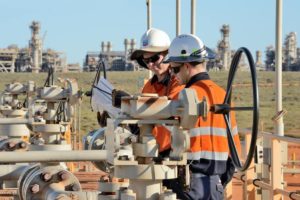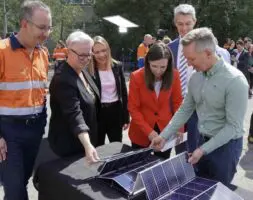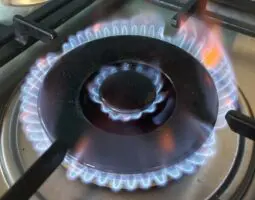Federal energy minister Chris Bowen has warned of the “cascading risks” to Australia’s national security from major changes to climate, and used it to push for urgent action this decade on emissions and clean energy.
In his annual climate statement to be released later on Thursday, and head of his planned trip to the UN climate talks in the UAE next week, Bowen argued that Australia, and the rest of the world, had to take urgent action now to reduce the risk of major disruptions.
“The National Security imperative just adds to the need for strong action this decade, and reinforces the importance of our domestic transformation and international engagement,” Bowen will say, according to an excerpt from his speech released to media.
“Australia will not sit on its hands, pause the transformation and expect to deploy speculative solutions in 2049 to address a climate emergency that is with us now.”
Australia has an 82 per cent renewables target by 2030, the headline act in its emissions target of cutting emissions by 43 per cent below 2005 levels by 2030.
The federal Coalition, however, and many in conservative media and some legacy industries, are urging the country to go slow on renewables and emissions, arguing that work on reaching net zero by 2050 can wait until future technologies, such as nuclear modular reactors, can make a contribution.
This goes against the scientific warnings in a year of already record temperatures and increased concerns about the potential collapse of the Antarctic ice sheets, the melting of permafrost and even the collapse of the Gulf Stream.
“The currently identified national security threats from climate change already present serious risks to Australia and the region, but they will become more severe and more frequent the further warming targets are exceeded,” Bowen says.
“The relationship between the level of warming and the threats faced is not linear; the threats will compound and expand exponentially the hotter the planet becomes.
“Climate change is an existential national security risk to our Pacific partners and presents unprecedented challenges for our region. It is likely to accentuate economic factors already fuelling political instability, including risks to water insecurity across the globe.”
The UN climate conference beginning this week is ostensibly to be a stocktake of governments policies, achievements and targets, but there are growing fears that – under the auspices of the UAE and the presidency of one of the fossil fuel industry’s most senior CEOs – it will turn into a expo for the oil and gas industries.
Australia will also come under scrutiny over its role as one of the world’s biggest fossil fuel exporters, something it seems in no hurry to change.
The climate statement says the global transition to clean energy will substantially boost global energy security due to more evenly distributed, abundant renewables and growing transport electrification.
However, it warns that maintaining a secure and affordable supply of legacy fuels during the transition is a priority for the government, as is the resilience of critical infrastructure in the face of extreme weather events or cyber attacks.
“The currently identified national security threats from climate change already present serious risks to Australia and the region, but they will become more severe and more frequent the further warming targets are exceeded,” the document says.
“The relationship between the level of warming and the threats faced is not linear; the threats will compound and expand exponentially the hotter the planet becomes.
Climate change is an existential national security risk to our Pacific partners and presents unprecedented challenges for our region. It is likely to accentuate economic factors already fuelling political instability, including risks to water insecurity across the globe.”










